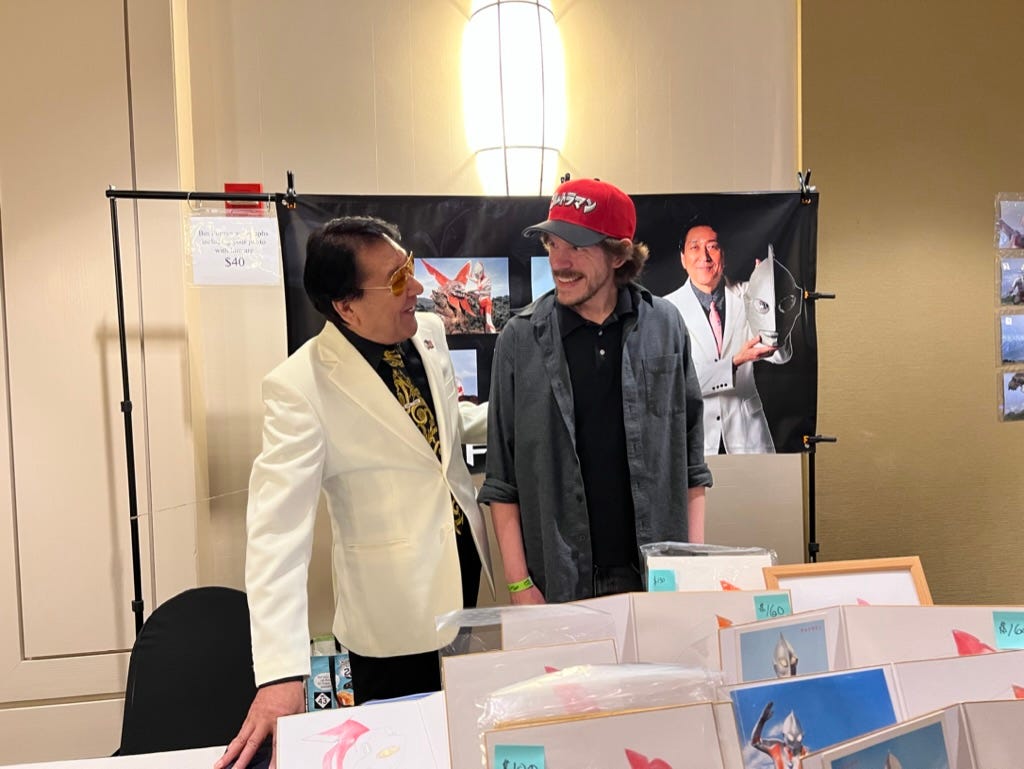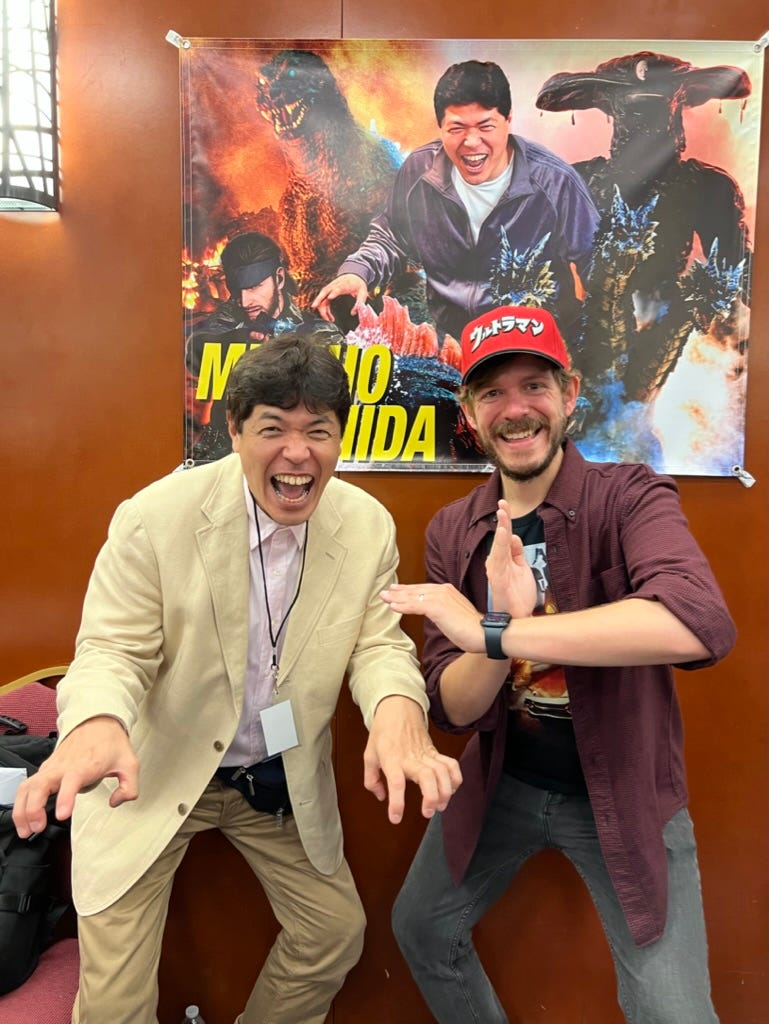How I Find Meaning in Ultraman and Godzilla
Japanese tokusatsu heroes inspire a high school teacher in the USA
Hey, how’s it going? I’m Erik Johnson—a veteran social studies teacher, university professor, and educator coach. In this newsletter, I share practical teaching tips, deep dives into education topics, and the occasional piece on my personal interests. If it’s your first time here, take a look at my coaching homepage, and don’t forget to subscribe!
A Free Show and Tell Article
Once a month, I take a moment to write about something that means a lot to me, even if it isn’t directly related to teaching. I hope you enjoy it!
The mark in his chest is a meteor,
He beats down the enemies proudly with his jet.
From the Land of Light for the sake of us,
Here he comes, our hero Ultraman.—Hajime Tsuburaya
Prepare yourself for a 6th-grade English class-style analysis of two massive Japanese media properties that have deep personal importance to a dopey white guy in the United States.
As a kid, I saw the 1954 Godzilla at the Music Box Theater with my dad and brother and appreciated it. But when I saw Shin Godzilla in 2016 or 2017, it was like my third eye opened.
I remember getting teary whenever Godzilla appeared and openly wept during the atomic breath scene. This is probably a weird response.
Why was I crying every time a big lizard showed up?
Like the best Godzilla movies, Shin Godzilla isn’t really about Godzilla. It’s an allegory, in this case, a satire and indictment of Japanese bureaucracy and poor handling of the Fukushima nuclear disaster. And while I cried at all the parts of the movie that a normal person would (ragtag heroes and the JSDF working against all odds to protect Japan), why was I crying every time a big lizard showed up? I couldn’t wrap my head around this until 2019.
In 2019, I got the Criterion Collection release of all the Showa Era Godzilla movies for Christmas. I slowly worked through them and followed them up with the Heisei and Millennium Era Godzilla films. I enjoyed them all for different reasons, but by watching each movie in quick succession, I was able to develop a clearer idea of why Godzilla resonated with me. See, Godzilla looks and behaves quite differently across all the movies he’s in. There are some goofy ones in the 1970s where he shakes hands with his friends.
There are others where he’s portrayed as actively vengeful. In one of my favorites, Godzilla is the reincarnation of the souls of those who died in the atrocities of the Pacific theater of WWII (I met the guy in that Godzilla suit!).
But Godzilla is at his peak when he is an unfeeling, undefeatable, deity-like animal.
So what’s Godzilla to me?
The metal band Mega Colossus sums Godzilla up best with these lyrics:
I am nature gone insane
Fission coursing through my veins
This world mankind has unmade
My savage breath takes away…
You can't destroy me
Only make me stronger
I wear the crown
King of all Monsters!
So what’s Godzilla to me? Aspirational catharsis. Impervious to all challenges. Unthinking, unfeeling, untethered, and unafraid.
Once I wrapped my Godzilla journey, I looked for other Japanese monster media to dig into. Deep analysis of what Godzilla means to me aside, I also just really like guys in rubber suits duking it out over miniature buildings and other cool practical effects. All signs pointed to Ultraman, a TV show from the 1960s that was created by the special effects whiz behind Godzilla, Eiji Tsuburaya.
Ultraman is immediately very different in tone than many of the Godzilla movies. The opening theme prominently features a children’s choir.
Can you believe I met the guy who performed as the original Ultraman TWICE!?
It’s bright and colorful and full of goofy sound effects. What’s special about Ultraman is the focus on heroism. Every season begins with a human putting themselves in grave danger (and often dying) to save someone. For example, my favorite Ultraman protagonist is a racecar driver named Hideki Go. In the first episode of his show, he dies rescuing a small child and a puppy from falling rubble during a monster attack. In response to these sacrifices, alien beings from “The Land of Light” in Nebula M78 merge their life force with the deceased human, allowing them to transform into giant silvery Ultra-beings to fight monsters and defend humanity.
It’s a little overly complicated, but the gist is that a human engages in an act of selflessness and then is empowered to run straight into danger (can you believe I met the guy who performed as the original Ultraman TWICE!?) and transform into a godlike alien being to save others.
They do this repeatedly until, at the end of each season, they make one final sacrifice and die. But what’s special about Ultraman compared to Godzilla is the emphasis on optimism and hope. The Ultras are a force for pure good that see the best in humanity. Teamwork, empathy, caring for others, hard work, and kindness are all emphasized. It’s a very prosocial show.
So what’s Ultraman to me? A great post from the Ultraman Connection website in 2022 sums it up best:
There are so many reasons to be fearful and frustrated these days...
Pandemics and polarization, energy and climate crises, and economic uncertainty are rising.
It may seem silly, but lately, at Ultraman Connection, we've been asking: "What Would Ultraman Do?'
Since the 1960s, these characters have been ahead of their time in their message to the world. While Adam West and Burt Ward were busy making puns, Ultraman stood against the threat of destructive technology, environmental disregard, and what happens when human beings lose respect for each other.
Is it so crazy to ask, "What Would Ultraman Do?" regarding some of the threats we face today?
If you believe that kindness, generosity, and hope win against chaos and destruction...
If you believe light can always triumph over evil if we choose to shine it...
If you believe that an act as simple as smiling can transform someone...
..then perhaps not.
I cry every time I read that. Why?
I think I live my life attempting to be Ultraman for all the good and bad that it does me. Particularly in my work as a teacher, I feel a heavy weight of responsibility to do right by my students, my colleagues, and my school. At work, I help others to such an extent that it takes a toll on the energy I have for my personal life. Thus, deep down, I wish I could be (and maybe should be) a little more Godzilla. After all, Godzilla is powerful, distant, and unaffected by human lives around him.
My challenge is to thread the needle between the two: to serve others with care, without sacrificing myself in the process. Can I bring Ultraman’s selflessness and Godzilla’s unshakable presence into better balance?
To quote the onomatopoetic rendering of Godzilla’s roar, “Skreeeeonk!”






